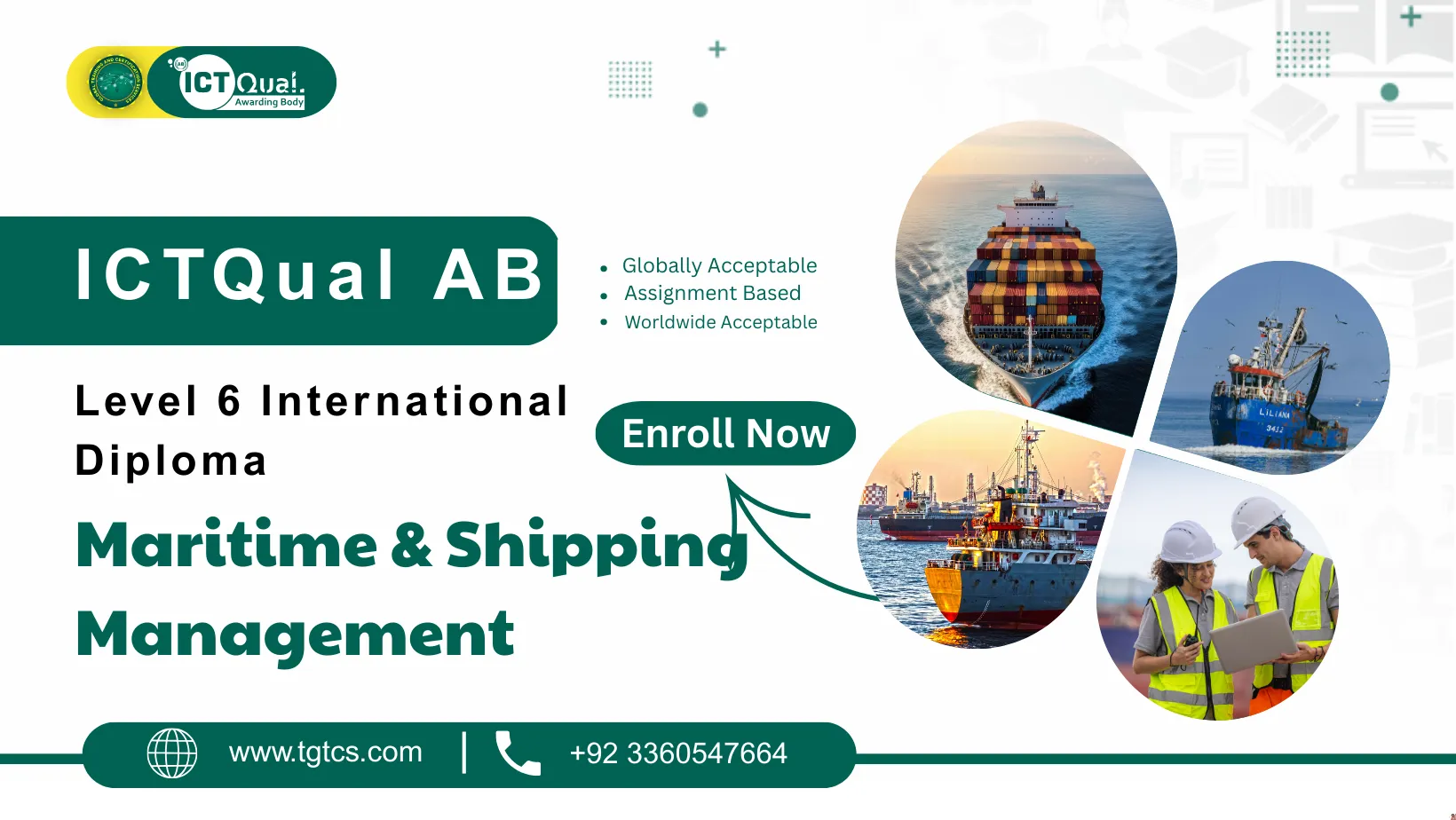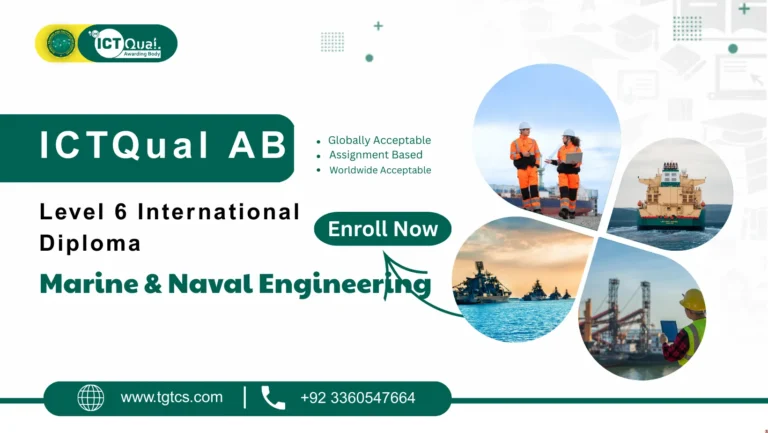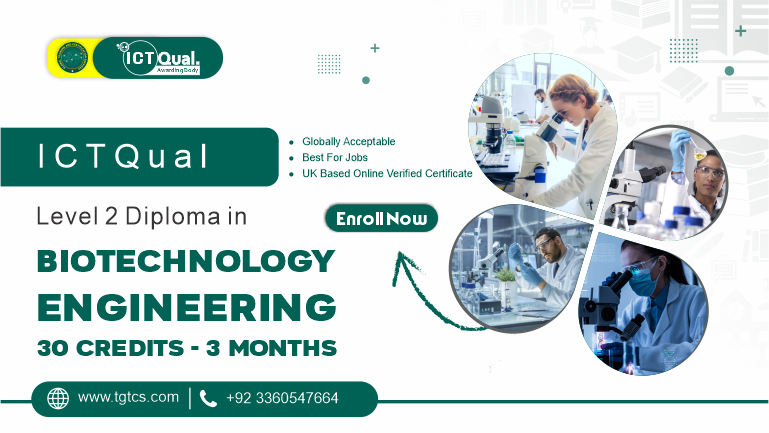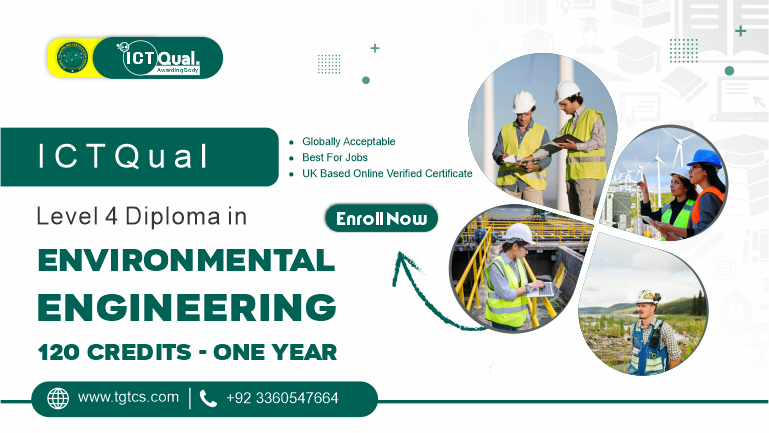ICTQual AB Level 6 International Diploma in Maritime & Shipping Management
In today’s global economy, maritime and shipping industries play a critical role in international trade, logistics, and economic growth. The ICTQual AB Level 6 International Diploma in Maritime & Shipping Management equips learners with advanced knowledge, practical skills, and strategic insight required to excel in shipping operations, maritime logistics, and port management.
This comprehensive program is designed for professionals, maritime managers, shipping entrepreneurs, and students who aim to develop expertise in the dynamic and highly regulated maritime sector. Learners will explore key areas such as shipping operations management, maritime logistics, vessel operations, port management, and international maritime regulations, providing a holistic understanding of global shipping practices.
The course emphasizes practical applications alongside theoretical frameworks, enabling students to manage shipping operations efficiently, optimize supply chain processes, and implement maritime safety and compliance standards. Through case studies, project-based learning, and industry-relevant simulations, learners gain proficiency in fleet management, maritime risk assessment, cargo handling, maritime economics, and environmental sustainability in shipping operations.
Graduates of this program will emerge as competent professionals capable of taking leadership roles in shipping companies, port authorities, maritime logistics firms, and international trade organizations. They will be prepared to make strategic decisions, ensure operational efficiency, and navigate complex regulatory environments while promoting sustainable maritime practices.
The Global Training and Certification Services is Approved Training Centre of ICTQual AB UK Ltd
Course Level and Credits
Level 6 International Diploma, 360 credits.
Suitable for professionals, maritime managers, shipping entrepreneurs, and students seeking advanced knowledge in maritime and shipping management.
Mode of Study
Fully assignment-based; learn at your own pace.
Accessible from anywhere in the world, flexible for working professionals and career changers.
Global Recognition & Attestation
British Council verifiable, MOFA and Embassy attested.
Recognized for career advancement, employment, and professional credibility in maritime, shipping, and logistics sectors globally.
Scope and Purpose
Comprehensive coverage of maritime operations, shipping management, port administration, maritime logistics, and international shipping regulations.
Focus on both theoretical understanding and practical application in real-world shipping and maritime industry scenarios.
Skills and Knowledge Gained
Shipping operations management, maritime logistics, port management, cargo handling, fleet operations, and risk assessment.
Leadership and strategic decision-making skills for managing maritime businesses, regulatory compliance, and operational efficiency.
Career Benefits
Opens opportunities in shipping companies, port authorities, maritime logistics firms, international trade organizations, and shipping consultancy.
Enhances professional credibility, employability, and global recognition in the maritime and shipping management sector.
Target Audience
Professionals, maritime managers, shipping entrepreneurs, and students aiming for careers in shipping operations, port management, maritime logistics, and international trade.
Unique Selling Points (USPs)
Flexible self-paced study, fully assignment-based.
Prestigious and globally recognized Level 6 diploma.
Ideal for leadership roles, international career advancement, and professional credibility in the maritime and shipping industry.
Mandatory Unit
This qualification, the ICTQual AB Level 6 International Diploma in Maritime & Shipping Management, consists of 36 mandatory units.
Year 1 – Foundations of Maritime & Shipping Management
- Introduction to Maritime & Shipping Industry
- Principles of Shipping Operations
- International Trade and Logistics Fundamentals
- Maritime Law and Regulatory Frameworks
- Port Operations and Management Basics
- Ship Types, Classification, and Vessel Management
- Maritime Safety and Security Principles
- Environmental Sustainability in Shipping
- Supply Chain and Transport Management
- Principles of Risk Management in Maritime Operations
- Introduction to Maritime Economics
- Professional Ethics and Communication in Shipping
Year 2 – Applied Maritime Operations & Management
- Advanced Shipping Operations and Planning
- Vessel Chartering and Freight Management
- Maritime Logistics and Supply Chain Integration
- Port Management and Terminal Operations
- Maritime Insurance and Risk Mitigation
- Crisis Management and Emergency Response in Shipping
- Shipping Finance and Budgeting
- Environmental Compliance and Marine Pollution Control
- Technology and Digitalisation in Maritime Industry
- Project Management in Maritime Operations
- Human Resource Management in Shipping Organisations
- Applied Case Studies and Operational Simulations
Year 3 – Strategic Leadership & Advanced Maritime Management
- Strategic Management in Maritime & Shipping Industry
- International Maritime Policies and Governance
- Maritime Trade Law and Contract Management
- Leadership and Decision-Making in Shipping Operations
- Advanced Risk and Safety Management in Maritime Sector
- Port and Terminal Strategic Planning
- Global Supply Chain Management for Maritime Trade
- Innovation and Emerging Technologies in Shipping
- Sustainability and Climate Change Adaptation in Shipping
- Research Methods for Maritime Management
- Independent Research Project in Maritime & Shipping Management
- Capstone Project: Applied Maritime & Shipping Strategy
The ICTQual AB Level 6 International Diploma in Maritime & Shipping Management is designed to equip learners with advanced knowledge, practical skills, and strategic expertise in global shipping, maritime operations, port management, and logistics.
Year 1 – Foundations of Maritime & Shipping Management
Introduction to Maritime & Shipping Industry
- Understand the structure, operations, and significance of the global maritime industry
- Explore international shipping routes, trade flows, and maritime organizations
- Identify key stakeholders and roles within shipping operations
- Analyze industry trends and challenges impacting global shipping
Principles of Shipping Operations
- Learn fundamentals of vessel operations and voyage planning
- Understand cargo handling, documentation, and shipping procedures
- Apply operational principles to optimize shipping efficiency
- Evaluate operational performance and identify improvement strategies
International Trade and Logistics Fundamentals
- Understand global trade principles and logistics networks
- Explore import-export procedures and international shipping documentation
- Analyze supply chain components affecting maritime operations
- Apply trade and logistics knowledge to enhance operational planning
Maritime Law and Regulatory Frameworks
- Understand international maritime conventions, laws, and treaties
- Analyze regulatory compliance requirements for shipping operations
- Explore legal implications of contracts, insurance, and maritime disputes
- Apply legal frameworks to operational and strategic decision-making
Port Operations and Management Basics
- Learn fundamentals of port infrastructure, terminal operations, and cargo handling
- Understand vessel scheduling, berth allocation, and port efficiency
- Explore operational challenges in port management
- Apply port management principles to optimize throughput and safety
Ship Types, Classification, and Vessel Management
- Identify different ship types and their operational characteristics
- Understand classification societies, vessel certification, and maintenance
- Apply vessel management strategies to enhance efficiency and compliance
- Evaluate operational risks and performance metrics for ships
Maritime Safety and Security Principles
- Understand safety regulations, standards, and maritime security protocols
- Explore risk assessment and accident prevention strategies
- Apply safety management systems for vessels and port operations
- Develop incident response plans and emergency procedures
Environmental Sustainability in Shipping
- Understand environmental challenges and sustainability practices in shipping
- Learn about marine pollution prevention, emissions control, and green shipping initiatives
- Apply sustainable strategies in maritime operations
- Evaluate environmental impact and compliance with international standards
Supply Chain and Transport Management
- Explore integrated supply chain and transport systems in maritime logistics
- Understand multimodal transport and cargo distribution networks
- Apply supply chain strategies to enhance operational efficiency
- Evaluate performance metrics and identify areas for improvement
Principles of Risk Management in Maritime Operations
- Understand risk identification, assessment, and mitigation techniques
- Apply risk management strategies to shipping operations and logistics
- Develop contingency and emergency response plans
- Evaluate risk impacts on operational and financial outcomes
Introduction to Maritime Economics
- Understand economic principles affecting maritime trade and shipping markets
- Analyze supply-demand dynamics, freight rates, and shipping costs
- Apply economic analysis to support operational and strategic decision-making
- Evaluate financial and operational performance in maritime contexts
Professional Ethics and Communication in Shipping
- Develop effective communication skills for maritime stakeholders
- Understand professional ethics, corporate governance, and regulatory compliance
- Apply negotiation and reporting techniques in shipping operations
- Promote collaboration and ethical practices within maritime organizations
Year 2 – Applied Maritime Operations & Management
Advanced Shipping Operations and Planning
- Plan complex shipping operations, including route optimization and scheduling
- Manage operational performance and efficiency across vessels and fleets
- Analyze shipping scenarios for cost-effectiveness and reliability
- Apply planning tools to streamline operations
Vessel Chartering and Freight Management
- Understand vessel charter types, agreements, and freight calculations
- Analyze market trends for freight optimization
- Manage contracts, negotiations, and shipping documentation
- Apply strategies for efficient cargo allocation and revenue generation
Maritime Logistics and Supply Chain Integration
- Integrate shipping operations with global supply chain networks
- Optimize transport and distribution for maritime logistics
- Apply inventory management and logistics coordination strategies
- Evaluate operational efficiency in integrated maritime supply chains
Port Management and Terminal Operations
- Manage port and terminal activities, including cargo handling and storage
- Optimize berth planning, vessel scheduling, and port productivity
- Implement safety, security, and environmental compliance measures
- Apply performance monitoring techniques for port operations
Maritime Insurance and Risk Mitigation
- Understand shipping insurance types and risk coverage options
- Apply risk mitigation strategies to protect assets and cargo
- Evaluate claims management and liability issues
- Integrate insurance planning into operational and strategic management
Crisis Management and Emergency Response in Shipping
- Develop emergency response plans for vessels and ports
- Coordinate multi-agency disaster and crisis management efforts
- Apply risk assessment and incident reporting techniques
- Evaluate crisis response performance for continuous improvement
Shipping Finance and Budgeting
- Understand financial management, budgeting, and cost control in shipping
- Analyze operational expenditures and revenue streams
- Apply financial planning tools to optimize fleet and port operations
- Evaluate financial performance for strategic decision-making
Environmental Compliance and Marine Pollution Control
- Implement international environmental regulations and standards
- Develop marine pollution prevention and waste management strategies
- Monitor environmental performance of vessels and port activities
- Apply sustainability measures in daily maritime operations
Technology and Digitalisation in Maritime Industry
- Utilize digital tools, software, and automation in shipping operations
- Apply maritime information systems for tracking, scheduling, and analytics
- Explore emerging technologies like IoT, blockchain, and AI in shipping
- Optimize operational efficiency and safety through technology integration
Project Management in Maritime Operations
- Plan, execute, and monitor maritime projects effectively
- Apply project management methodologies for operational improvements
- Develop risk mitigation and resource allocation strategies
- Evaluate project outcomes and continuous improvement measures
Human Resource Management in Shipping Organisations
- Manage workforce planning, recruitment, and training in maritime firms
- Apply leadership and performance evaluation techniques
- Promote effective team coordination and communication
- Ensure compliance with maritime labor regulations and safety standards
Applied Case Studies and Operational Simulations
- Analyze real-world maritime operational scenarios
- Apply theoretical knowledge to practical shipping challenges
- Conduct simulation exercises for crisis, port, and fleet management
- Evaluate operational decisions for improved performance
Year 3 – Strategic Leadership & Advanced Maritime Management
Strategic Management in Maritime & Shipping Industry
- Develop long-term strategic plans for maritime organizations
- Align operational decisions with organizational goals
- Analyze market trends and competitive dynamics in shipping
- Apply strategic tools to improve organizational performance
International Maritime Policies and Governance
- Understand global maritime policies, conventions, and governance frameworks
- Apply regulatory compliance and policy knowledge in operations
- Analyze the impact of international regulations on shipping businesses
- Implement governance best practices across maritime organizations
Maritime Trade Law and Contract Management
- Understand legal frameworks governing shipping contracts and trade
- Analyze liabilities, claims, and dispute resolution procedures
- Apply contract management and negotiation strategies
- Ensure compliance with maritime law in commercial operations
Leadership and Decision-Making in Shipping Operations
- Develop leadership skills for operational and strategic management
- Apply critical thinking and decision-making frameworks in complex scenarios
- Lead multi-disciplinary teams in shipping and port operations
- Evaluate leadership effectiveness and organizational outcomes
Advanced Risk and Safety Management in Maritime Sector
- Implement advanced risk management techniques for vessels and ports
- Develop safety protocols and emergency preparedness strategies
- Monitor and mitigate operational hazards
- Evaluate safety performance for continuous improvement
Port and Terminal Strategic Planning
- Develop long-term strategies for port efficiency and competitiveness
- Optimize terminal operations and cargo throughput
- Integrate technology and sustainability initiatives in port management
- Monitor performance metrics and strategic KPIs
Global Supply Chain Management for Maritime Trade
- Manage international supply chain operations for shipping companies
- Optimize logistics, cargo handling, and multimodal transport networks
- Apply performance analysis and risk management in global supply chains
- Implement strategies for efficiency, cost reduction, and sustainability
Innovation and Emerging Technologies in Shipping
- Explore emerging technologies like AI, IoT, and blockchain in maritime operations
- Apply innovative solutions for operational efficiency and safety
- Integrate digital tools into fleet, cargo, and port management
- Evaluate the impact of technology on competitiveness and compliance
Sustainability and Climate Change Adaptation in Shipping
- Implement sustainable shipping practices to reduce environmental impact
- Develop strategies for climate adaptation in maritime operations
- Monitor emissions, waste management, and regulatory compliance
- Promote corporate social responsibility and green initiatives
Research Methods for Maritime Management
- Apply qualitative and quantitative research methods in maritime contexts
- Conduct industry analysis and data-driven decision-making
- Develop research projects addressing operational and strategic challenges
- Present findings effectively to stakeholders and decision-makers
Independent Research Project in Maritime & Shipping Management
- Conduct an in-depth research project on a specific maritime issue
- Apply advanced analytical and project management skills
- Provide evidence-based recommendations for operational or strategic improvement
- Demonstrate professional competence and critical thinking
Capstone Project: Applied Maritime & Shipping Strategy
- Integrate knowledge from all course units into a practical project
- Design and implement a comprehensive maritime or shipping strategy
- Analyze outcomes and evaluate effectiveness of operational or strategic solutions
- Showcase leadership, decision-making, and project management expertise
The ICTQual AB Level 6 International Diploma in Maritime & Shipping Management empowers learners with the knowledge, practical skills, and leadership expertise required to excel in the global maritime and shipping industry.
Enhanced Career Opportunities
- Gain an internationally recognized Level 6 qualification in maritime and shipping management
- Access leadership roles in shipping companies, port authorities, maritime logistics firms, and international trade organizations
Practical Skills Development
- Acquire expertise in shipping operations,management, port administration, and maritime logistics
- Develop hands-on skills in cargo handling, fleet planning, supply chain integration, and operational efficiency
Strategic and Analytical Competence
- Learn to analyze maritime trade, shipping markets, and regulatory frameworks
- Build decision-making skills for optimizing operations, mitigating risks, and managing global supply chains
Policy and Regulatory Knowledge
- Understand international maritime laws, shipping regulations, and governance standards
- Apply policies and compliance measures to ensure legal and ethical shipping operations
Innovation and Leadership in Shipping
- Drive innovative solutions using emerging maritime technologies and digital tools
- Cultivate leadership skills to manage teams, coordinate operations, and implement sustainable shipping practices
This course prepares learners to become confident professionals and strategic leaders capable of managing complex shipping operations, ensuring regulatory compliance, and promoting sustainable growth in the maritime industry worldwide.
The ICTQual AB Level 6 International Diploma in Maritime & Shipping Management is designed for learners aiming to advance their careers in shipping operations, port management, maritime logistics, and international trade.
Shipping Professionals
- Enhance operational and management skills in shipping and maritime logistics
- Gain expertise in fleet management, cargo handling, and port operations
Career Changers in Maritime Industry
- Transition into maritime and shipping management with practical and theoretical knowledge
- Acquire competencies in regulatory compliance, shipping finance, and strategic planning
Organizational Leaders and Managers
- Improve decision-making and leadership skills for shipping operations and port administration
- Ensure compliance with international maritime laws and organizational standards
Maritime Logistics and Supply Chain Specialists
- Develop expertise in supply chain integration, logistics planning, and transportation management
- Optimize operational efficiency and enhance global trade performance
Researchers and Academics
- Deepen understanding of maritime economics, trade policies, and sustainability in shipping
- Conduct applied research projects and contribute to innovative shipping management solutions
This course prepares learners to become skilled professionals and strategic leaders capable of managing complex maritime operations, driving operational efficiency, and promoting sustainable practices in global shipping and logistics.
Course Overview
Course Level
Level 6
Course Units
36 Units
Credits
360
Duration
3 years






